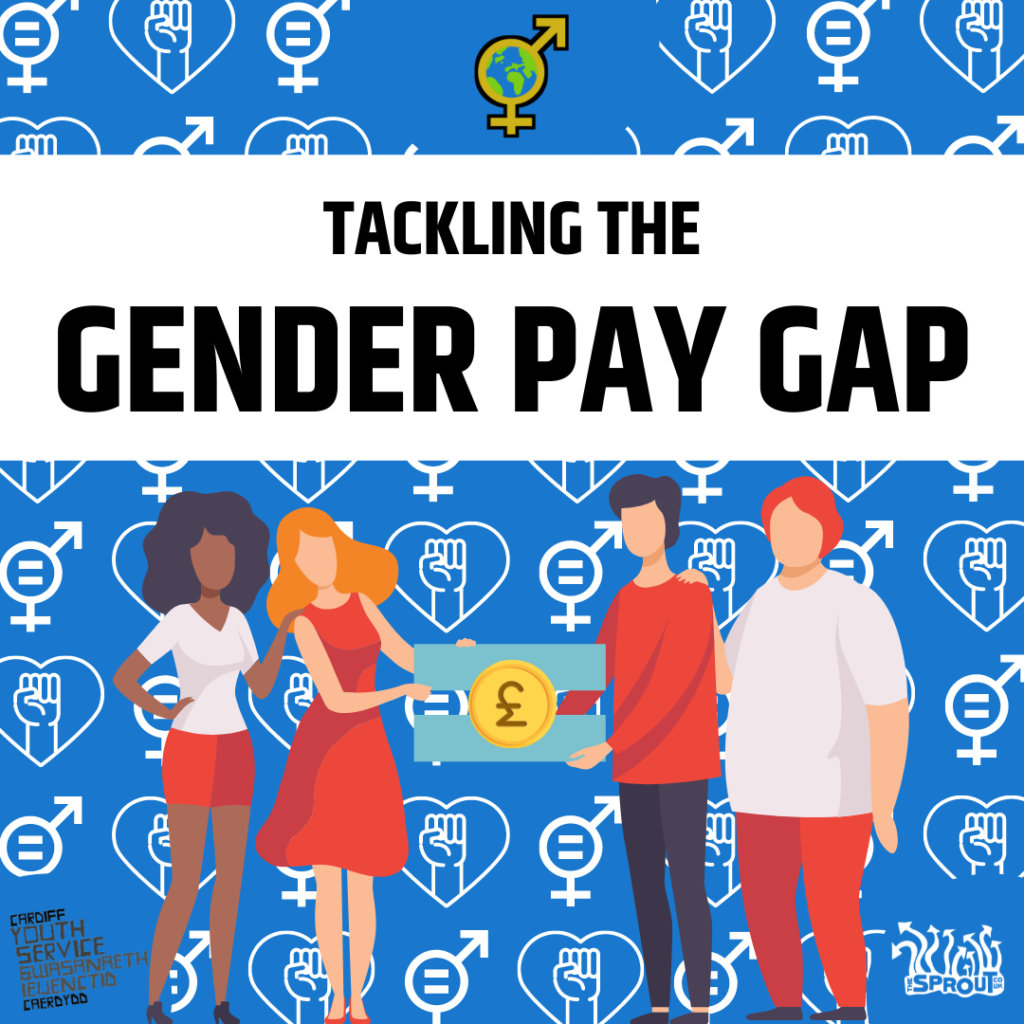This article discusses potential causes for the gender pay gap as part of The Future Is Feminist campaign. Young people in Cardiff’s views toward the gender pay gap have been shared, as well as a discussion on how we can combat this gap.
This is the second part of a two-part article. Click here to read the first part.
What causes the gender pay gap?
More women work in low-skilled jobs such as catering, caring, clerical, and cleaning jobs where the pay is lower. However, usually men work in jobs where pay is higher such as in finance, manufacturing, construction, and insurance.
Women are also more likely to work part-time than men. Part-time employment is often more poorly paid compared to full-time work, usually because part-time work is often lower skilled. Well paid senior positions such as CEO or manager are usually full-time roles.
Childcare is also another factor at play in the gender pay gap. Women spend less time in a job and often do different jobs for a short period of time to balance work and childcare commitments. Sometimes women leave work for a few years to look after their children and consequently leave their career. Stepping back onto the career ladder is difficult for women, especially those who are mothers.
Despite all these differences that can contribute to the gender pay gap, women are still paid less than men for doing the exact same amount of work. This is despite the introduction of the UK’s Equal Pay Act 1970. For example, according to the Equality and Human Rights Commission in 2017, female medical practitioners earned 30% less than their male counterparts.
Forward thinking
It’s undeniable that the gender pay gap is unfair, but how do we move forward with this and make positive change? To delve into this further, TheSprout asked the young people at Cardiff Youth Service the following questions:
- In your opinion, who is most responsible for making a difference to the gender pay gap?
- What can we do to fight the gender pay gap?
Here’s what they had to say…
In your opinion, who is most responsible for making a difference to the gender pay gap?
One young person suggested that employers have a responsibility to tackle the gender pay gap:
‘Employers should tackle the gender pay gap to ensure their employees are compensated appropriately for their time, effort, and hard work.’ – Hal
Most young people suggested that it is the responsibility of governments and politicians to bring about systemic change as they’re the people in positions of power:
‘Given that we live in a capitalist society, I’d say speak to the top businesses, CEOs, and conglomerates as they’re the real boss men.’ – Eshaan
‘I think that the government are most responsible for tackling the gender pay gap in the UK as they have the biggest influence over mandatory policy.’ – Hal
‘I think those in power, the government and CEOs, are responsible for making the difference.’ – Anonymous
‘Politicians and business tycoons must make the difference. It should not be the place of women to protest against their own devaluation. The problem is systematic so the system must be changed.’ – Tomos
It was also suggested that women/feminist groups are responsible for making a difference to the gender pay gap:
‘People like the Suffragettes.’ – Dylan
A couple of the young people shared how it should be the responsibility of men to make a difference to the gender pay gap, rather than women alone:
‘If men have money, voice, and power, it is the responsibility of men to make a difference to the gender pay gap.’ – Hal
‘In order for people in power to take the gender pay gap more seriously, I think we need more men to speak out against it.’ – Anonymous
It would seem as though the young people at Cardiff Youth Service believe that everyone should be responsible for closing the gender pay gap and that nobody is exempt from trying to battle gender inequality:
‘I think all of us should be responsible for closing the gender pay gap.’ – Anonymous
‘We the people.’ – Anonymous
So, what can we do to fight the gender pay gap?
Some young people shared that making noise about the gender pay gap by talking about it with openly and raising awareness about gender inequality is a good place to start:
‘Encourage conversations about pay rises and salaries rather than having them non-negotiable. Both men and women should be able to feel their value to a company.’ – Tomos
‘We can make it more noticeable on social media.’ – Ava
One young person suggested the importance of educating people on gender inequalities to tackle the gender pay gap:
‘We need more unconscious bias training in schools and workplaces.’ – Eshaan
Politics were seen as a route to fighting the gender pay gap by some young people:
‘Elect a stronger political party that mean business and are not run by a man who can’t even comb his own hair or a man that got thrown out of a pub.’ – Anonymous
‘Voting is the most powerful non-violent tool we have to making change in society! Vote for political leaders who have a manifesto and take action to close the gender pay gap.’ – Hal
Protesting was seen as the most popular idea for tackling the gender pay gap by young people:
‘Protest and make sure that those people in power know that it’s not acceptable.’ – Anonymous
‘Spreading awareness about it so that people will be able to take action by doing stuff like protesting.’ – Dylan
‘Peacefully protesting is a great way to have our voices heard about the mass injustice of the gender pay gap across the UK.’ – Hal
Related Content
To find out more about the campaign group and to read more content from The Future Is Feminist campaign, click here.

